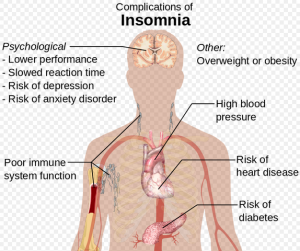Does it matter that a new report says Americans are sleeping less? What purpose does sleep actually serve? We spend approximately one-third of our lives sleeping. For many years, we have approached sleep as wasted, unproductive, and useless time doing nothing. Only in the past decade have we begun to understand the significance of sleep. We have learned about the significance of sleep by observing patterns of behavior in individuals who have abnormal sleep.

Insomnia complications can impact the brain, organs and immune system. Illustration courtesy Häggström, Mikael. “Medical”
Disordered sleep a predictor of neurodegenerative disorders
Brain and neurodegenerative disorders can be preceded by REM-sleep behavior disorder. REM-sleep behavior disorder, a condition during which sleeping individuals physically act out, is a predictor of neurodegenerative disease including Parkinson’s disease and Lewy body dementia. In one study in 2008, the 12 year risk of developing a neurodegenerative disease (Alzheimer’s disease, Parkinson disease, Lewy body dementia, and multiple system atrophy) was 52.4% in patients who had REM-sleep behavior disorder. From this data, scientists extrapolate that proper sleep is necessary for cognitive health, and prevents neurodegenerative processes from occurring.
Chronic insomnia, a risk factor for diseases
It is estimated that about 10% of the population experiences day-time impairment due to chronic insomnia. Chronic insomnia is linked to depression, cardiovascular disease, hypertension, cognitive impairment and motor impairment. Sleep disorders are associated with depression implies that sleep somehow helps us adapt to emotionally stressful events. Sleep apnea, a condition during which sleeping individuals stop breathing usually due to airway obstruction, predisposes to diabetes, cardiovascular disease and cognitive impairment.
Dreams and memory
Sleep and dreams appear to play a significant role in memory. It appears that during sleep, our brains replay the day’s events, and help sort out the meaning of the events and extract meaning. Sleep appears to help “maintain” the brain. It is during sleep that our brains are somehow cleansed of toxins and harmful substances that can predispose to Alzheimer’s disease and other neurodegenerative diseases. Sleep disturbance is one of the earliest signs of Alzheimer’s disease.
Insomnia and heart disease
Sleep deprivation adversely affects the health of our hearts, and this can be objectively measured by measuring proteins and vital signs of test subjects who are sleep deprived and compared to those who obtain adequate amounts of sleep. The connection between sleep disorders and vascular disease suggests that sleep somehow decreases vascular stress.
The investment of sleeping well
Researchers are learning more and more about what actually happens when we sleep and how vital it is to our physical and cognitive health. In their second article on sleep, The New Yorker explores the importance of sleep to our memory and problem-solving abilities. The bottom line is that sleep helps our brains stay young, sharp, and healthy. Conversely, when our brains don’t get enough sleep, various health disorders and neurodegenerative disease can set in. Read on to learn more about the latest experiments and research on why we sleep: http://www.newyorker.com/science/maria-konnikova/why-we-sleep
If you or someone you know is in need of a better night’s sleep, contact us for a no obligation consultation. We are the sleep specialists at Chevy Chase ENT located in the Virginia, Maryland, and Washington D.C. metro area dealing with sleep apnea and sleep-related problems. We can help diagnose your condition, recommend whether a sleep study would be beneficial, and offer you a variety of treatment options including CPAP, Radio Frequency Ablation (RFA) and more.
